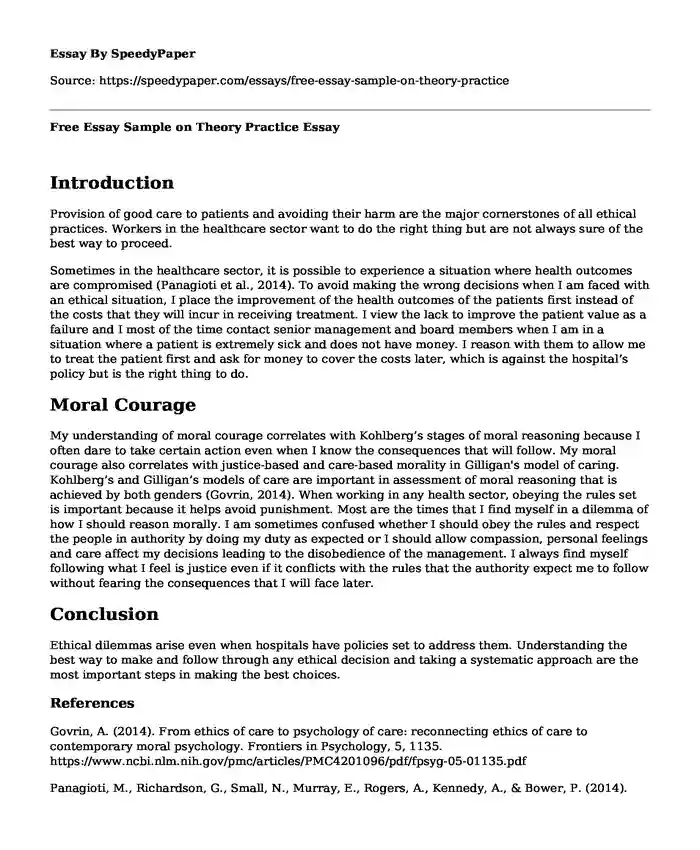
| Type of paper: | Essay |
| Categories: | Ethics Healthcare Nursing care Social issue Moral development |
| Pages: | 2 |
| Wordcount: | 452 words |
Introduction
Provision of good care to patients and avoiding their harm are the major cornerstones of all ethical practices. Workers in the healthcare sector want to do the right thing but are not always sure of the best way to proceed.
Sometimes in the healthcare sector, it is possible to experience a situation where health outcomes are compromised (Panagioti et al., 2014). To avoid making the wrong decisions when I am faced with an ethical situation, I place the improvement of the health outcomes of the patients first instead of the costs that they will incur in receiving treatment. I view the lack to improve the patient value as a failure and I most of the time contact senior management and board members when I am in a situation where a patient is extremely sick and does not have money. I reason with them to allow me to treat the patient first and ask for money to cover the costs later, which is against the hospital’s policy but is the right thing to do.
Moral Courage
My understanding of moral courage correlates with Kohlberg’s stages of moral reasoning because I often dare to take certain action even when I know the consequences that will follow. My moral courage also correlates with justice-based and care-based morality in Gilligan's model of caring. Kohlberg’s and Gilligan’s models of care are important in assessment of moral reasoning that is achieved by both genders (Govrin, 2014). When working in any health sector, obeying the rules set is important because it helps avoid punishment. Most are the times that I find myself in a dilemma of how I should reason morally. I am sometimes confused whether I should obey the rules and respect the people in authority by doing my duty as expected or I should allow compassion, personal feelings and care affect my decisions leading to the disobedience of the management. I always find myself following what I feel is justice even if it conflicts with the rules that the authority expect me to follow without fearing the consequences that I will face later.
Conclusion
Ethical dilemmas arise even when hospitals have policies set to address them. Understanding the best way to make and follow through any ethical decision and taking a systematic approach are the most important steps in making the best choices.
References
Govrin, A. (2014). From ethics of care to psychology of care: reconnecting ethics of care to contemporary moral psychology. Frontiers in Psychology, 5, 1135.
https://www.ncbi.nlm.nih.gov/pmc/articles/PMC4201096/pdf/fpsyg-05-01135.pdf
Panagioti, M., Richardson, G., Small, N., Murray, E., Rogers, A., Kennedy, A., & Bower, P. (2014). Self-management support interventions to reduce health care utilisation without compromising outcomes: a systematic review and meta-analysis. BMC Health Services Research, 14(1), 356. https://bmchealthservres.biomedcentral.com/track/pdf/10.1186/1472-6963-14-356.
Cite this page
Free Essay Sample on Theory Practice. (2023, Nov 10). Retrieved from https://speedypaper.net/essays/free-essay-sample-on-theory-practice
Request Removal
If you are the original author of this essay and no longer wish to have it published on the SpeedyPaper website, please click below to request its removal:
- Osteoporosis Research Paper Example
- The impacts of the internet
- Essay Sample on List of Appropriate Differential Diagnoses
- Why Do People Take Drugs? - Essay Sample
- Essay Sample on Fall Prevention Compliance
- Paper Example on Collaboration Activity: Social Media Impact on World Events
- Essay Example: Raising the Minimum Wage
Popular categories




